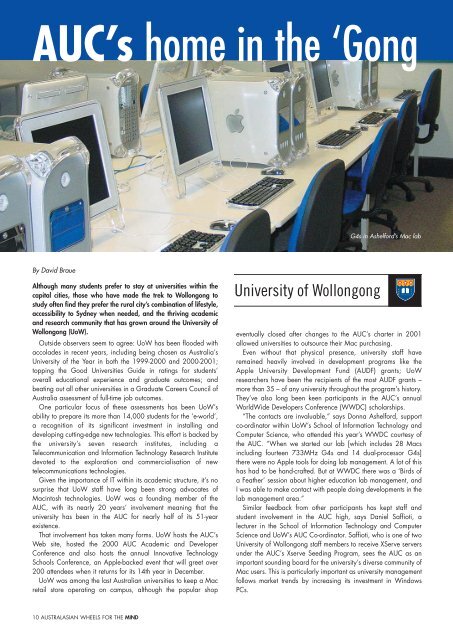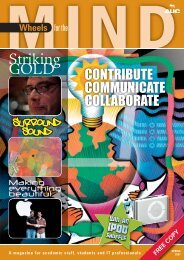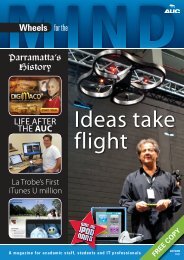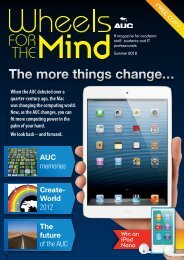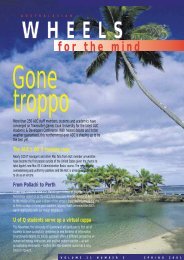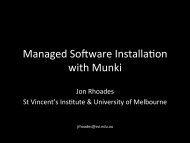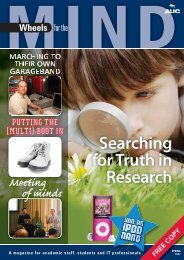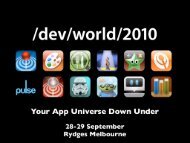for the mind - AUC
for the mind - AUC
for the mind - AUC
You also want an ePaper? Increase the reach of your titles
YUMPU automatically turns print PDFs into web optimized ePapers that Google loves.
<strong>AUC</strong>’s home in <strong>the</strong> ‘Gong<br />
G4s in Ashel<strong>for</strong>d’s Mac lab<br />
By David Braue<br />
Although many students prefer to stay at universities within <strong>the</strong><br />
capital cities, those who have made <strong>the</strong> trek to Wollongong to<br />
study often find <strong>the</strong>y prefer <strong>the</strong> rural city’s combination of lifestyle,<br />
accessibility to Sydney when needed, and <strong>the</strong> thriving academic<br />
and research community that has grown around <strong>the</strong> University of<br />
Wollongong (UoW).<br />
Outside observers seem to agree: UoW has been flooded with<br />
accolades in recent years, including being chosen as Australia’s<br />
University of <strong>the</strong> Year in both <strong>the</strong> 1999-2000 and 2000-2001;<br />
topping <strong>the</strong> Good Universities Guide in ratings <strong>for</strong> students’<br />
overall educational experience and graduate outcomes; and<br />
beating out all o<strong>the</strong>r universities in a Graduate Careers Council of<br />
Australia assessment of full-time job outcomes.<br />
One particular focus of <strong>the</strong>se assessments has been UoW’s<br />
ability to prepare its more than 14,000 students <strong>for</strong> <strong>the</strong> ‘e-world’,<br />
a recognition of its significant investment in installing and<br />
developing cutting-edge new technologies. This ef<strong>for</strong>t is backed by<br />
<strong>the</strong> university’s seven research institutes, including a<br />
Telecommunication and In<strong>for</strong>mation Technology Research Institute<br />
devoted to <strong>the</strong> exploration and commercialisation of new<br />
telecommunications technologies.<br />
Given <strong>the</strong> importance of IT within its academic structure, it’s no<br />
surprise that UoW staff have long been strong advocates of<br />
Macintosh technologies. UoW was a founding member of <strong>the</strong><br />
<strong>AUC</strong>, with its nearly 20 years’ involvement meaning that <strong>the</strong><br />
university has been in <strong>the</strong> <strong>AUC</strong> <strong>for</strong> nearly half of its 51-year<br />
existence.<br />
That involvement has taken many <strong>for</strong>ms. UoW hosts <strong>the</strong> <strong>AUC</strong>’s<br />
Web site, hosted <strong>the</strong> 2000 <strong>AUC</strong> Academic and Developer<br />
Conference and also hosts <strong>the</strong> annual Innovative Technology<br />
Schools Conference, an Apple-backed event that will greet over<br />
200 attendees when it returns <strong>for</strong> its 14th year in December.<br />
UoW was among <strong>the</strong> last Australian universities to keep a Mac<br />
retail store operating on campus, although <strong>the</strong> popular shop<br />
eventually closed after changes to <strong>the</strong> <strong>AUC</strong>’s charter in 2001<br />
allowed universities to outsource <strong>the</strong>ir Mac purchasing.<br />
Even without that physical presence, university staff have<br />
remained heavily involved in development programs like <strong>the</strong><br />
Apple University Development Fund (AUDF) grants; UoW<br />
researchers have been <strong>the</strong> recipients of <strong>the</strong> most AUDF grants –<br />
more than 35 – of any university throughout <strong>the</strong> program’s history.<br />
They’ve also long been keen participants in <strong>the</strong> <strong>AUC</strong>’s annual<br />
WorldWide Developers Conference (WWDC) scholarships.<br />
“The contacts are invaluable,” says Donna Ashel<strong>for</strong>d, support<br />
co-ordinator within UoW’s School of In<strong>for</strong>mation Technology and<br />
Computer Science, who attended this year’s WWDC courtesy of<br />
<strong>the</strong> <strong>AUC</strong>. “When we started our lab [which includes 28 Macs<br />
including fourteen 733MHz G4s and 14 dual-processor G4s]<br />
<strong>the</strong>re were no Apple tools <strong>for</strong> doing lab management. A lot of this<br />
has had to be hand-crafted. But at WWDC <strong>the</strong>re was a ‘Birds of<br />
a Fea<strong>the</strong>r’ session about higher education lab management, and<br />
I was able to make contact with people doing developments in <strong>the</strong><br />
lab management area.”<br />
Similar feedback from o<strong>the</strong>r participants has kept staff and<br />
student involvement in <strong>the</strong> <strong>AUC</strong> high, says Daniel Saffioti, a<br />
lecturer in <strong>the</strong> School of In<strong>for</strong>mation Technology and Computer<br />
Science and UoW’s <strong>AUC</strong> Co-ordinator. Saffioti, who is one of two<br />
University of Wollongong staff members to receive XServe servers<br />
under <strong>the</strong> <strong>AUC</strong>’s Xserve Seeding Program, sees <strong>the</strong> <strong>AUC</strong> as an<br />
important sounding board <strong>for</strong> <strong>the</strong> university’s diverse community of<br />
Mac users. This is particularly important as university management<br />
follows market trends by increasing its investment in Windows<br />
PCs.<br />
10 AUSTRALASIAN WHEELS FOR THE MIND


